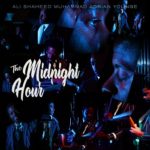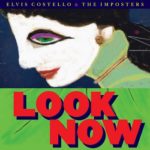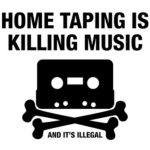 It’s High Fives time again and we had to check twice because we couldn’t believe it the first time – this is the fifth successive year that Neil Sheasby, co-songwriter and bass player in the astonishingly good Stone Foundation has contributed a piece to this feature, so we had to give him another Number One to add to his collection of singles. Stone Foundation have been huge favourites with the Riot Squad ever since a copy of “To Find the Spirit” popped through the letterbox (yep, that was letterbox, not inbox) in early 2013. It’s fair to say we’ve all come a long way since then. Anyway, let’s see what Neil has to say about 2018.
It’s High Fives time again and we had to check twice because we couldn’t believe it the first time – this is the fifth successive year that Neil Sheasby, co-songwriter and bass player in the astonishingly good Stone Foundation has contributed a piece to this feature, so we had to give him another Number One to add to his collection of singles. Stone Foundation have been huge favourites with the Riot Squad ever since a copy of “To Find the Spirit” popped through the letterbox (yep, that was letterbox, not inbox) in early 2013. It’s fair to say we’ve all come a long way since then. Anyway, let’s see what Neil has to say about 2018.
1 – TINY DESK CONCERTS
 The Tiny Desk Concerts are a series of short performances broadcast by NPR music from Washington DC, it’s been a thing for around ten years now I believe but really started to gain momentum via you tube over the past year or two.
The Tiny Desk Concerts are a series of short performances broadcast by NPR music from Washington DC, it’s been a thing for around ten years now I believe but really started to gain momentum via you tube over the past year or two.
I’ve been kind of hooked on them this year and have discovered some great new artists and witnessed sets by heritage acts such as Tower of Power, Trouble Funk, Roy Ayers etc… The ones that really left an impression though were the artists that I didn’t know too much about prior to their stints on Tiny Desk, artists like Tank & the Bangas, Tom Misch, Tuxedo, PJ Morton.
It’s a musical treasure trove, when I get into it I’m there tuned in for hours. Very Inspiring.
2 – DIG THE NEW BREED
 I think 2018 has been a really incredible year for new music, I’ve probably discovered more stuff than ever before.
I think 2018 has been a really incredible year for new music, I’ve probably discovered more stuff than ever before.
Sometimes it may just be a single tune or it may lead to checking out a whole project that really strikes a chord.
I was really taken by “The Midnight Hour” album, a collaboration between Adrian Younge & Ali Shaheed Muhammad. Lots of guest vocalists and also a smattering of instrumentals that remind me of David Axelrod. I also really liked the Tom Misch Album “Geography”, he’s like a young jazz guitarist with cool tunes, I went to see him with my son recently.
“Girlfriend” by Christine and the Queens qualifies for my song of the year, 80’s revisionist stylings delivered with two feet firmly planted in the future.
I also dug records by Seinabo Sey, Leon Bridges, Neil Frances, a band called The Internet and that Childish Gambino tune “This is America”, I thought the video was genius. Real cutting edge.
3 – ELVIS COSTELLO – LOOK NOW
 Somewhat of a pleasant surprise. I think this new album is up there with his best work, a great collection of songs that tick all the different boxes and previous guises of EC. His voice is great too, seems to be improving with age.
Somewhat of a pleasant surprise. I think this new album is up there with his best work, a great collection of songs that tick all the different boxes and previous guises of EC. His voice is great too, seems to be improving with age.
I thought Paul’s (Weller) album was really special too, a reflective charm to mark his 60th year.
Nice to have the old guard deliver as well as new delights.
They are two of our finest craftsmen when it comes to songwriting. Long may their flames burn bright.
One other complete surprise from a group I would have possibly wrote off was the new record from China Crisis “Autumn in the Neighbourhood” fantastic songs, still mining a Mersey take on Steely Dan!
4 – DAYS IN EUROPA
 Somewhat ironically in the wake of the confusion and fall out over Brexit, we have been spending a lot of time touring over in Europe. We did a couple of particularly rewarding jaunts around both Spain and Germany. Really great gigs, attendances were fantastic and audiences were so responsive.
Somewhat ironically in the wake of the confusion and fall out over Brexit, we have been spending a lot of time touring over in Europe. We did a couple of particularly rewarding jaunts around both Spain and Germany. Really great gigs, attendances were fantastic and audiences were so responsive.
They value the arts and culture & invest in it a lot more than we do here.
I respect and enjoy the more considered approach abroad, there seems to be more emphasis on community and an air of positivity & solidarity.
I’m mystified as to why we would want to distance ourselves as a nation from the great bonds that have been forged for so many years with our neighbours across Europe.
I can understand & appreciate some EU rulings & laws are flawed but the bigger picture of us alienating ourselves from the rest of Europe as people on a humanitarian level just can’t bode well for future generations.
I’m not so sure it was broke to the extent of forcing such extreme changes upon us.
We loved our time touring out there this year, a real highlight of the 2018 calendar.
5 – HOME TAPING (still killing music?)
 The week our album “Everybody, Anyone” was released I was asked to make a playlist by our friend Danny Champ for his Union music store Spotify feature. I sent over about 20 songs that I liked and Danny published them on Spotify which in turn made me finally investigate the merits of it.
The week our album “Everybody, Anyone” was released I was asked to make a playlist by our friend Danny Champ for his Union music store Spotify feature. I sent over about 20 songs that I liked and Danny published them on Spotify which in turn made me finally investigate the merits of it.
I soon realised the joys to be found in making playlists on there, I found it kind of replaces my love of compiling songs on cassette for people, I’d missed that.
Home taping. It’s kind of a musical love letter.
I’ve embraced Spotify this year and not only pieced together several (very well received) compilations that I sent out on social media for anyone that was remotely interested, I also found it to be another avenue to discover new tunes & artists, which of course has to be a good thing right?
Record collecting via the physical format will always remain my passion but I was buoyed and excited to find another way of connecting and sharing great music.
So, another week in the music business and the hot topic is copyright again; that’s surprised everyone hasn’t it? Apple announces its new streaming service and a great introductory three month deal which it proposes to fund by not paying any royalties to artists. Predictably enough the Anne Robinson of digital rights management rides to the rescue. After taking on Spotify last year, Taylor Swift took aim at Apple this time with an open letter which has forced Apple to rethink its strategy of giving away other people’s earnings. Predictably again, it sparked off an online debate about hypocrisy when a photographer sent Ms Swift an open letter about photographic rights. It’s amazing how quickly these ‘debates’ descend into playground name-calling and tribalism; have a look for yourself but it’s not for the faint-hearted. Anyway, it’s all happy now because Apple has backed down and the artists will be paid.
While all that was going on centre-stage, you could easily miss another bit of copyright news being made which wasn’t attracting the attention of the popular and powerful Ms Swift. Various British music industry bodies, Musicians Union (MU), UK Music, and British Academy of Songwriters, Composers and Authors (BASCA) if you must know, have combined to request a judicial review into the creation of Section 28B of the Copyright, Designs and Patents Act 1988. Now that’s a real headline grabber isn’t it? In really simple terms, the government has inserted a clause (Section 28B) in the legislation, to take effect from June 2015, which made copying of CDs legal for personal, private use although you probably thought it was fine to do that anyway. The judicial process is far from over, but Mr Justice Green has upheld the review application.
On the face of it, these industry bodies are using the same principle as Taylor Swift, claiming that artists are losing royalties and that the industry shouldn’t allow this to happen, which is very noble of them, but if that’s true, then why take twenty years to decide that we shouldn’t be allowed to rip our CDs so we can listen to them on the train or create playlists for parties. Unless it isn’t just about that.
One of the remedies suggested by the music industry is a levy on recordable media (CDs, hard drives and so on), which has been tried in other European states. So call me an old cynic if you like, but surely their real concern is that the blank media industry is reaping the benefits of digital copying and the music industry isn’t getting its share. The UK proposal is a levy on blank media collected by an agency and shared out with artists. You don’t need a PhD to see that there’s absolutely no link between which songs are copied and the money coming in, so a huge and unnecessary bureaucracy has to be created to work out the collection and distribution process (supervised by the UK music biz). Anyone think that’s fair? And there’s an assumption that all digital media sold is being used for copying music; you can call me paranoid, but I have several hard drives and countless DVD-Rs full of original photos and there’s no way I’m paying duty on those so some chancer can copy Celine Dion’s Greatest Hits to flog in the market at Elephant & Castle. It’s like the whole class having to stay behind because the teacher doesn’t have the bottle to take on the bully.
So, how about an extra charge on every CD to account for a certain amount of ripping and copying? Well, one side of the argument is that no-one wants to pay for something that they can’t play on a device they use on the move, while, on the other hand, why should you pay extra if you have no intention of copying a CD? You could apply a charge when a CD is copied (or format-shifted) but who’s going to be happy about buying a CD from the artist’s website or at a gig to maximize the artist’s cut only to find that you then have to pay someone else for the privilege of listening to it on your media player. It’s equitable, but music buyers are going to be reminded of the cost every time they rip a CD (which is why MU, BASCA and UK Music don’t like it; they don’t look like the bad guys if you pay extra for a hard drive, rather than your music).
If the CD format is dying, and I’ve already bought a black tie, is this an attempt to accelerate its demise? If you’re buying a physical copy mainly to listen to it on a mobile device, why not just get rid of the middleman and buy it in a format you can load on to your media player? If there isn’t a physical copy you can eliminate the costs of artwork, packaging, storage and distribution and companies don’t need to worry about size of production runs when they sell on demand. If your album’s aimed at that hardcore who still want a physical package, then you can sell it on vinyl at a premium price and you can even throw in a digital download code, because it won’t increase your costs.
Let’s be completely honest about this; the music industry is going for the soft target again. Rather than try to take on organised counterfeiters, they’re trying to recoup their perceived losses by hitting, and alienating, music fans who have no objection to paying for a product. The business was quite happy to reap the benefits of digitisation in the production and distribution process but doesn’t like to see the customers using the same technology to shift formats for the user’s convenience. It certainly puts the eighties ‘Home taping is killing music’ campaign into perspective.
As always, the UK music establishment is frantically trying bolt the door when the stables have been empty for years while. Perhaps it’s one last cynical attempt to cash in on the punters who realise that they need to copy their CDs before the indestructible format vanishes and, ultimately, so do the CD players. So, if you’re one of those strange people that still believes in paying for music, you’ll have two choices: cheap and cheerful download or premium price (currently about twice the price of a CD) vinyl copy. As for streaming, well no artist I know is happy with their level of reward from Spotify, but the establishment’s comfortable with a lower percentage of an increasing volume for very little investment and the big players are now buying in to streaming services for their mass market activities.
Are there any alternatives to accepting the lower sound quality of MP3s and the high price of vinyl (and something to play it on if you didn’t save it from the first time round)? You could try uncompressed audio; Neil Young’s been touting his Pono format for a few years (other formats are available) and better internet bandwidth and bigger hard drives are making that more attractive now. Sound purists love it, but it’s a digital format and there’s no tactile packaging, photos or sleeve notes, and you could see it as just another way to resell back catalogue (again) in another format. Or maybe Cooking Vinyl MD, Martin Goldschmidt was right five years ago when he predicted the CD ‘will actually become a minority (non-mass market) format in the way that vinyl has’. Wouldn’t that be ironic?
So, what have we got this time then? A new premium-quality music streaming service; well, that’s just what we need; isn’t it? Especially when you line up a bunch of superstar investors for a launch event that makes the service sound like it’s going to put an end to world conflict. I’m not even giving you a link to the video of the launch because on the tedium scale it’s somewhere between a party election broadcast and watching custard set. Here’s the summary: two minutes of introductions (to a crowd that apparently hasn’t heard of any of the celebrity stakeholders), ten minute ‘inspirational’ speech from Alicia Keys, two minutes of signing ‘the document’ and two minutes of standing around looking embarrassed while someone tries to find a border collie or a cattle prod. Sixteen minutes and Madonna only hogged the limelight once; that has to be a record. I’ve had more fun at the dentist.
Just take a look what this motley crew (they’ve got one thing in common, but we’ll get to that) are so evangelical about; what are they actually trying to sell you? Basically, the sales pitch is that it’s like Spotify but better, which means you have to pay twice as much for it. I’m not saying Spotify is perfect but if the alternative is punters downloading illegally and artists being paid bog all, then I’m on the side of Spotify. Tidal isn’t an attempt to address the big issue of music having no value because you can download it free from any number of illegal sites, it’s purely about commercial rivalry; we’re better than Spotify but that’s reflected in the subscription price. Unlike Spotify, there isn’t a ‘free’ version of Tidal, you buy in or you don’t.
And then there’s “lossless” compression. In the words of John Lydon, ‘ever get the feeling you’ve been cheated’ – there’s no such thing as lossless compression. You can compress something so that it sounds reasonable on a phone or a media player, but why not try playing that same file through a decent hi-fi setup. No, don’t, that was rhetorical, it’s going to sound horrible; if you take information out of an audio file, it’s going to be noticeable eventually if your ears do more than keep your head balanced. If you stream audio, the higher the quality, the more problems you’ll have with buffering so you wouldn’t want to make things more difficult by introducing video playback, would you? Yeah, you just might, and you might want to introduce social features (nothing new) and have the music carefully curated (obviously not patronising at all – we’ll tell you what you should like) while you offer exclusivity (you can hear the new Beyoncé song here first).
So, the bottom line is that you can pay twice as much as you would pay for Spotify for the dubious privilege of “lossless” streaming which will sound just the same on your earbuds or PC speakers; anyone buying in to that yet? Thought not; how about new artists, surely an ‘artist-owned’ service would help to bring new talent through the system. No, not even a mention, so who benefits from this premium service? Easy, the bunch of artists on the stage at the beginning of this piece. The bunch of artists who have one thing in common; against the odds in the twenty-first century, have already made huge amounts of money from the dying embers of the music business. None of the artists involved in this enterprise actually need more money, but they’re happy to take if they can get it.
Maybe Jay Z’s pissed off that Dre managed to corner the market in headphones, but that’s no excuse for launching this ill-conceived ‘premium’ service. No-one involved with this project comes out of it with any credit.


